The third Candidates tournament held in the Netherlands was from March 27 to April 30 of 1956, where ten players competed for the right to challenge the World Champion. In comparison to the previous event, (Zurich, 1953), FIDE reduced the number of participants from 15 to 10. The challenger of the previous World Championship match, Vasily Smyslov, was seeded directly, and the other participants qualified from the Gothenburg Interzonal (1955).
The opening ceremony took place on 26 March in Vossius Gymnasium, Amsterdam where the chairman of the Dutch Chess Federation, Hendrik Jan van Steenis, and FIDE President, Folke Rogard, held welcoming speeches. The fifth World Champion (1935-1937), Max Euwe, conducted the drawing of lots. All the rounds except the tenth and eleventh (that were held in Leeuwarden) were played in Amsterdam.
Unlike the Candidates in Zurich, which turned into a close duel between Smyslov and Reshevsky, this time around it was wide open almost until the very end as at least four grandmasters had a fair chance to challenge Botvinnik.
After the first part of the event, Efim Geller was leading the field with 6 points (+3) followed by Paul Keres and David Bronstein with 5.5 points (+2). The winner of the Candidates in Zurich (1953) Vasily Smyslov was sitting on 5 points after spoiling an overwhelming position and losing to young Spassky in Round 9.
Round 10 complicated matters even more, as Petrosian defeated Geller, whereas Keres went through a lost position against Bronstein, scored a very important victory and reached the +3 mark.
The ex-leader’s problems did not end there – in the next round, Geller fell to Smyslov. To his credit, he managed to rebound in Round 11, then beat Filip with Black and caught up with Keres. In Round 14 Smyslov scored his fourth victory in the event and joined this duo.
The culmination of the entire tournament came in Round 16 when Smyslov faced Bronstein who was just a half-point behind after prevailing over Geller the day before. Both opponents were pushing hard but it was Smyslov who came out on top. Later on, the seventh World Champion included this victory in all his best games collections.
Smyslov – Bronstein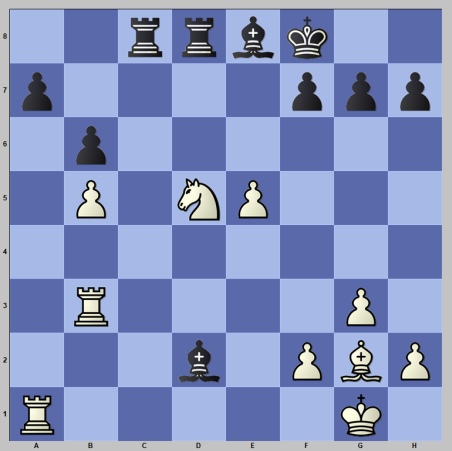
Black has just played a natural 31…Bg5-d2? Which turned out to be a decisive mistake
32.e6! Bg5 (32…fxe6 33. Rf3+) 33.h4 fxe6 34.Bh3 Bd7 35.Rxa7 exd5 36.Rxd7 and White won on move 57.
Smyslov made a strong claim for the first place as Bronstein dropped out of the race, but Keres was hard on his heels. The oldest participant (Paul was 41) tried a new energy-saving strategy in Amsterdam: if Keres did not manage to obtain a promising position after the opening he offered a draw. In the penultimate round, Keres achieved a won position against Filip and got a real chance to catch up with Smyslov.
Keres – Filip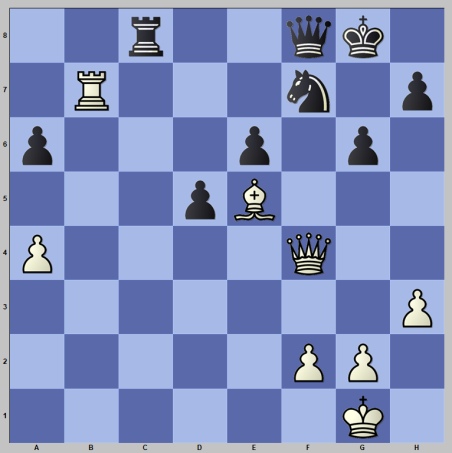
An obvious 38.Qf6 was winning easily (38…Nxe5 39.Qxe5 Re8 40.Qc7), but Keres played an overly “accurate” move 38.Kh2?? which was met with 38…Rc4! – Black got a defensive idea of Qf4+. After 39.Qf6 Nxe5! Keres opted to play a piece down but resigned on move 91 after a stubborn but hopeless defense.
It is worth noting though that even in the case of Keres’ victory, Smyslov had a much better chance for the first place as in the last round he faced a “weak link” Herman Pilnik with White whereas his main rival took on Petrosian with Black. Still, it would have been an exciting final round but it was not meant to be.
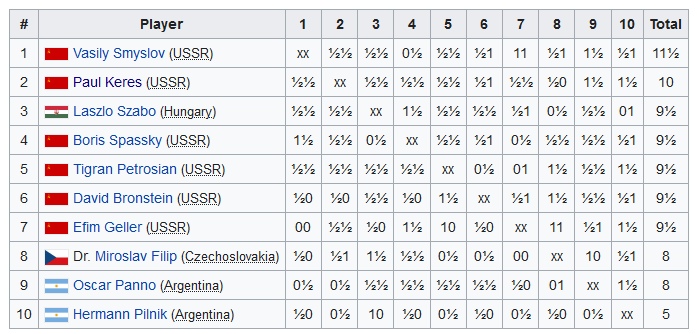
Source: Wikipedia
Smyslov took well-deserved first place winning his second Candidates tournament in a row, whereas Keres eventually finished second and secured a spot in the next Candidates tournament. A big group of participants tied for third place, but their paths were quite different.
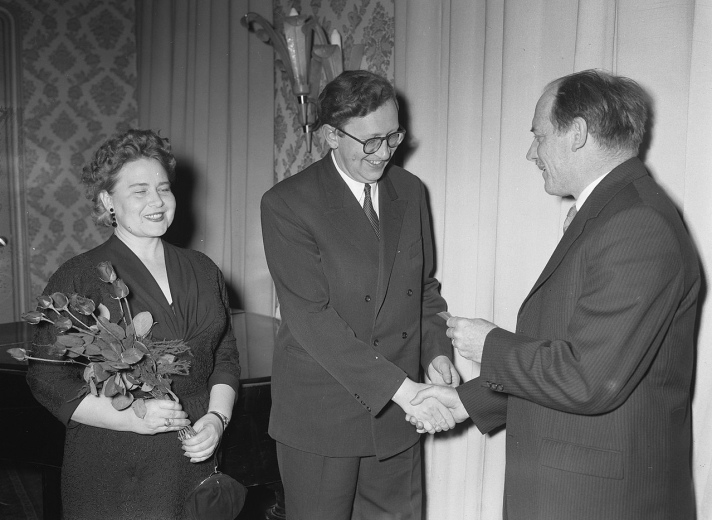
The leader after the first part of the event, Efim Geller, scored as many victories as Smyslov but suffered five defeats (two of them at the hands of the eventual winner). The last one, in the final round with White against Laszlo Szabo, was particularly vexing as a draw would have allowed him to tie for second with Keres. Unlike Geller, Szabo did not have a chance for first place at any point, but this victory catapulted him to the third position in the final standings.
The winner of the Gothenburg Interzonal, David Bronstein, was not in his best form but remained in the contest for first place until Round 16. All in all, despite receiving a “gift” from Petrosian he lost two crucial games to his main competitors (Keres and Smyslov).
Tigran Petrosian was hardly content with his result as arguably he became the main underperformer of the tournament – take for example two won positions the future ninth World Champion achieved in the games versus Bronstein and Smyslov in which he netted zero points. The first defeat was particularly bitter:
Petrosian – Bronstein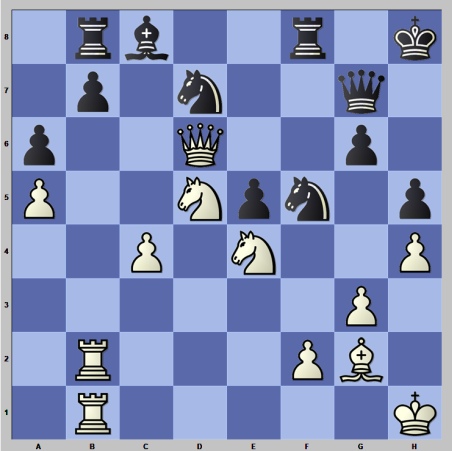
White is in total control but Petrosian played 36.Ng5?? ignoring the only Black’s treat and after 36…Kxd6 resigned immediately, although Bronstein had just a few seconds left on his clock.
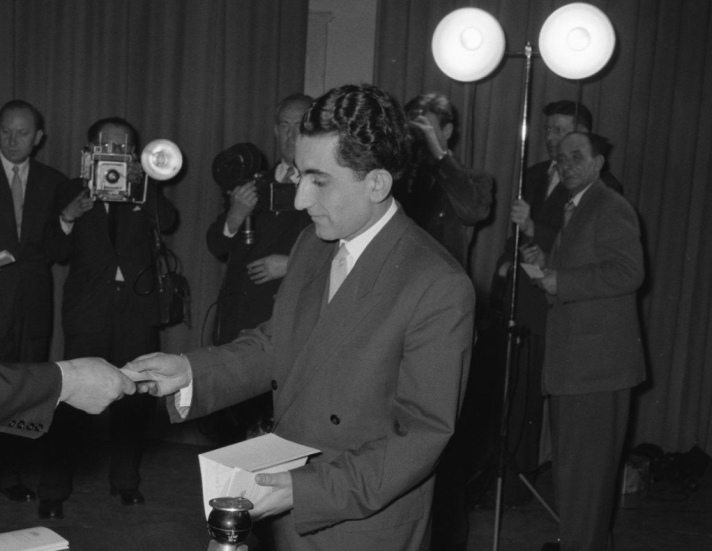
Nevertheless, it became evident for many that Petrosian would be one of the main contenders in the future Candidates tournaments. Indeed, six years later he won a marathon competition in Curacao (1962) and eventually became the ninth World Champion.
The youngest participant of the event, 19-year old World Junior Champion Boris Spassky, also scored a decent +1. Just like Petrosian, he did not compete for first place, but beat the eventual winner, Smyslov, and Bronstein along the way and showed great potential. Who could ever imagine back then that it would be his first and last Candidates tournament? But that is exactly what happened – Spassky missed the next two cycles failing to qualify for Interzonals (it is just another piece of evidence attesting the high level of USSR championships) and later on played only Candidates matches.
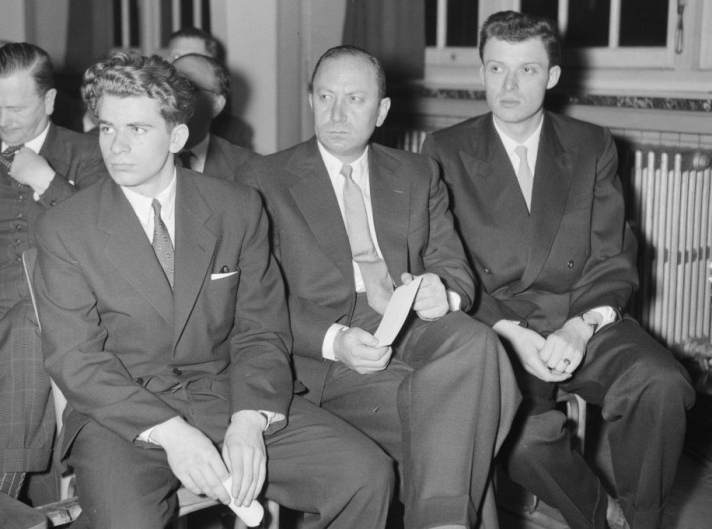
Miroslav Filip and Oscar Panno had their bright moments in the event but their level was not high enough to hold out against the top Soviet grandmasters.
The event in Amsterdam (1956) showcased Smyslov’s dominance throughout the 1950s. Indeed, during this decade he won two Candidates tournaments, played three title matches, and became the seventh World Champion.
Photo credit: Herbert Behrens / ANEFO, via http://gahetna.nl

